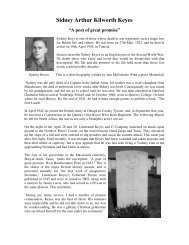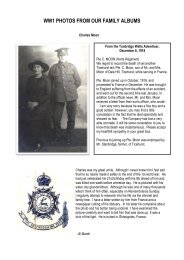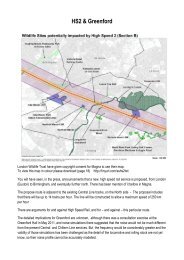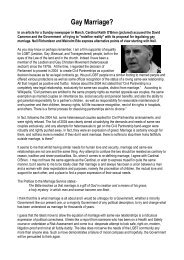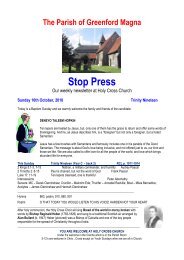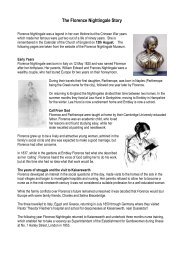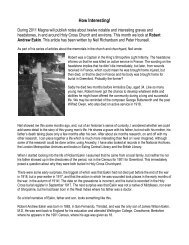Poems that shaped me - The Parish of Greenford Magna
Poems that shaped me - The Parish of Greenford Magna
Poems that shaped me - The Parish of Greenford Magna
You also want an ePaper? Increase the reach of your titles
YUMPU automatically turns print PDFs into web optimized ePapers that Google loves.
effect <strong>of</strong> the drug combined with the alcohol made him increasingly violent and so mad he began to growl and<br />
bark like a dog, he was tried out on all sorts <strong>of</strong> substitute pills, including one <strong>that</strong> he proudly said was used to<br />
tranquillise rhinoceroses.”<br />
Tom was born in Hensingham, Cumberland. He started to study law at Selwyn College, Cambridge, then<br />
changed to a psychology course at Birkbeck, University which he completed. He then went on to study English<br />
at the University <strong>of</strong> Durham. After graduation he moved to London and beca<strong>me</strong> involved with the Soho<br />
literature circuit. He held a Gregory Fellowship in poetry at the University <strong>of</strong> Leeds between 1956 to 1958. He<br />
was married three ti<strong>me</strong>s and with his second wife Rosalie de Meric he had a daughter, Julia Blackburn.<br />
Julia wrote <strong>of</strong> the last few days <strong>of</strong> Tom’s life,<br />
“He had two divorces and several breakdowns, but then at the age <strong>of</strong> 60 he had a vision <strong>of</strong> the afterlife, which<br />
made him happy because he realised he was no longer afraid <strong>of</strong> dying. A year later, in the early morning <strong>of</strong><br />
August 13, 1977, he finished writing a long letter to his brother with the words 'I am now going to lie down in a<br />
horizontal position and breathe long and deep'. He then went upstairs and died from a cerebral haemorrhage,<br />
just as he was getting into bed.”<br />
By one <strong>of</strong> those strange quirks, his funeral was conducted by none other than R.S. Thomas, the poet with<br />
whom I am planning to end this series next month. Tom Blackburn was living in Wales at the end <strong>of</strong> his life,<br />
and R.S. Thomas was specially asked because both <strong>me</strong>n were poets, although I don’t know if they ever <strong>me</strong>t.<br />
Hospital for Defectives is a specially powerful poem. It asks questions about human weaknesses and<br />
especially what was in the mind <strong>of</strong> God when it ca<strong>me</strong> to these <strong>me</strong>ntal hospital inmates whose lives seem so<br />
different to ours and so<strong>me</strong>how, without serious purpose. <strong>The</strong> <strong>me</strong>n don’t speak to each other or communicate<br />
and Thomas asks the question in wonderful words:<br />
“What is the <strong>me</strong>aning to be found<br />
In such dark vowels as these”<br />
<strong>The</strong> depth <strong>of</strong> enquiry, addressed perhaps despairingly rather than angrily to God, is very provocative and I felt<br />
the power <strong>of</strong> this poem as a young man, and still do, more than 40 years later. We all find ourselves confused<br />
by the presence <strong>of</strong> seemingly pointless suffering and the human response to people with disabilities and<br />
learning difficulties can so<strong>me</strong>ti<strong>me</strong>s be cruel.<br />
“Beneath the warder's blows,<br />
<strong>The</strong> unleavened man did not cry out”<br />
<strong>The</strong>re are ti<strong>me</strong>s when all the positive and wonderful aspects <strong>of</strong><br />
creation and human creativity seem snared and bedraggled by<br />
failure. We are accusto<strong>me</strong>d to regarding the Creation as “good”<br />
in the words <strong>of</strong> God in the Book <strong>of</strong> Genesis, so are these <strong>me</strong>n<br />
in a turnip field to be considered God’s failures<br />
We may not ever co<strong>me</strong> to a conclusion, but with Thomas<br />
Blackburn, we certainly have a good question for the Almighty!<br />
“Through such <strong>me</strong>n in a turnip field<br />
What is it <strong>that</strong> you say”<br />
Julia and Thomas in the garden <strong>of</strong> his house, in Putney, where he lived with his third wife, Peggy, in April 1965. This is<br />
very much the Tom Blackburn I knew when I was a young student.





